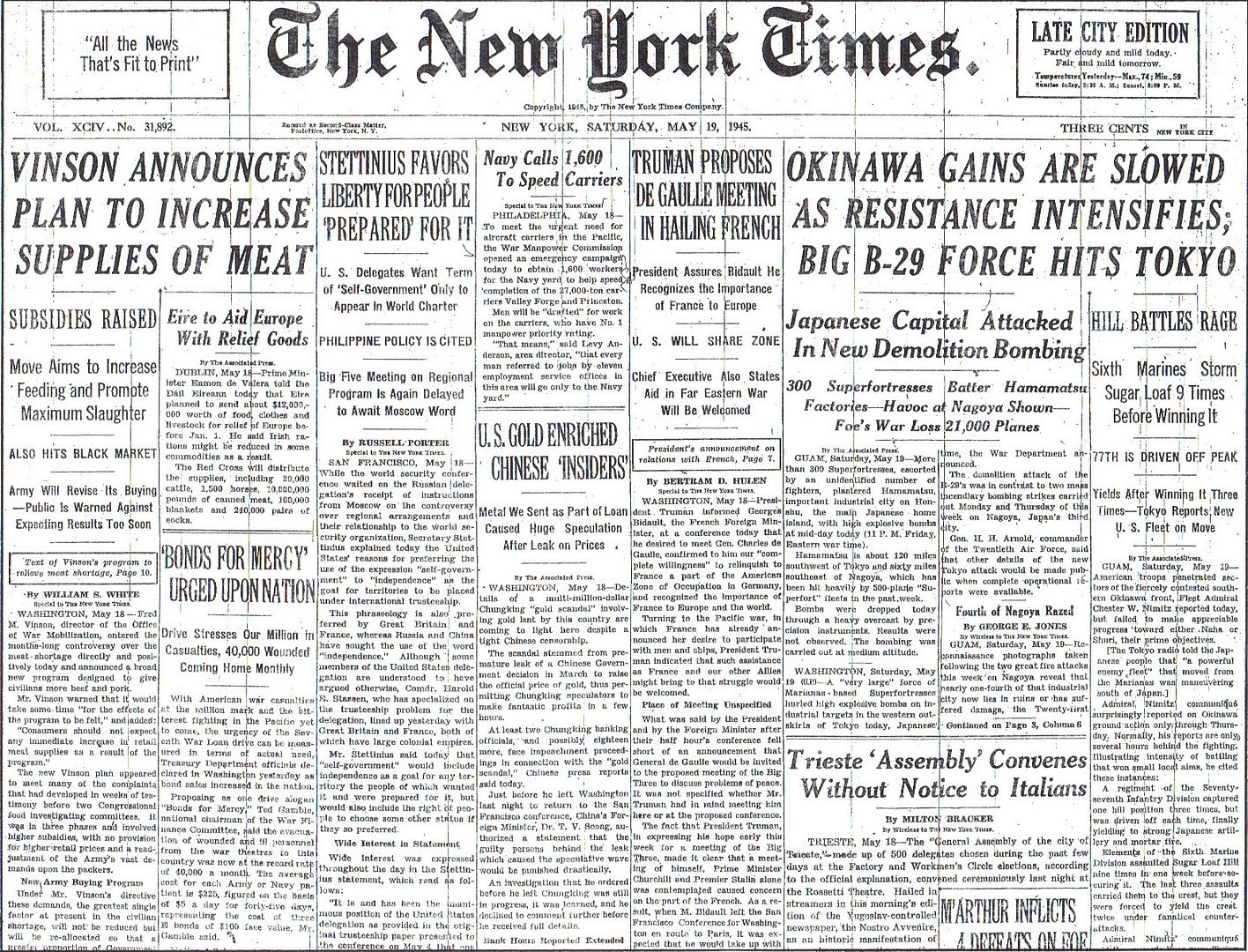
Posted on 05/19/2015 4:31:18 AM PDT by Homer_J_Simpson

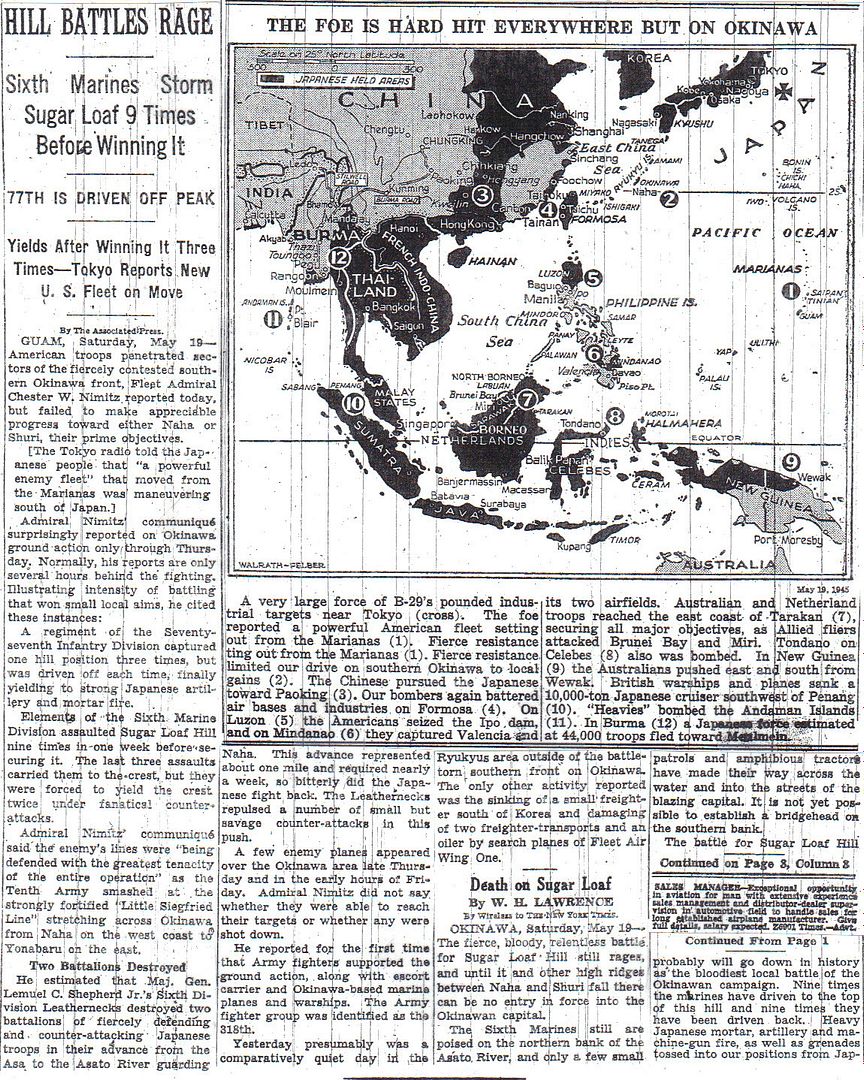
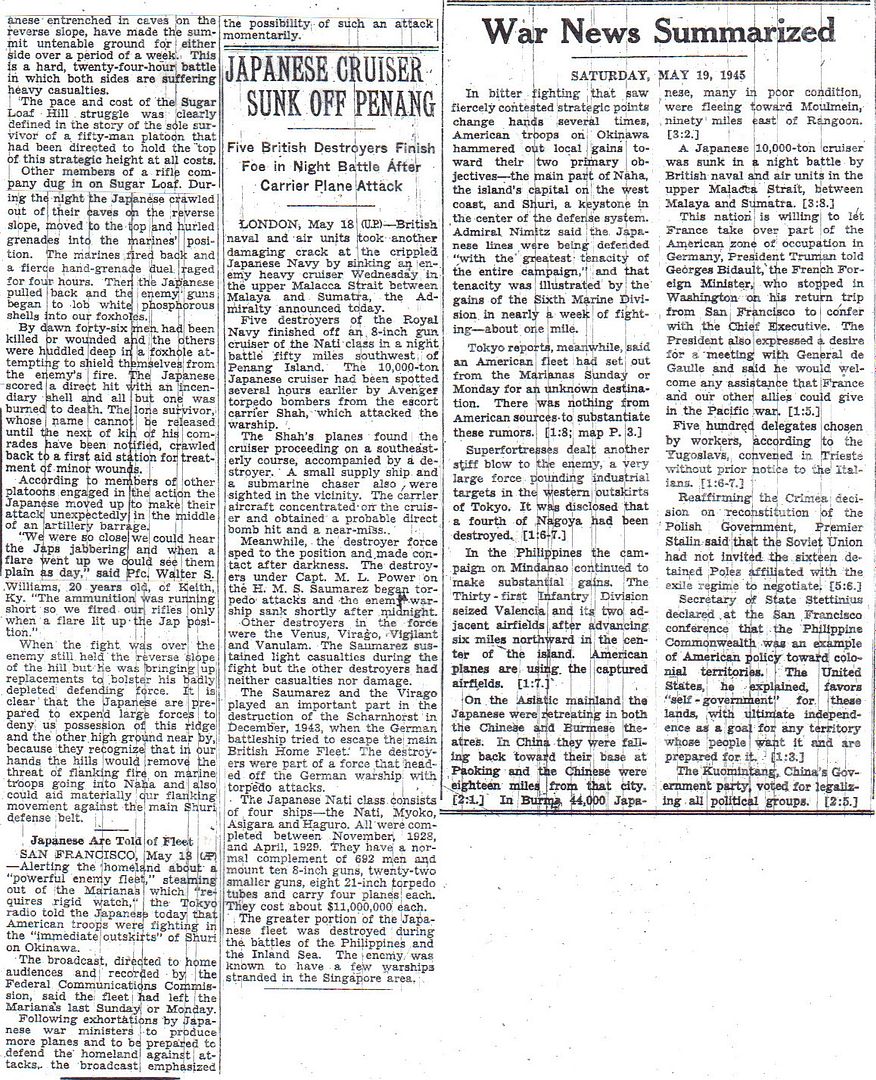
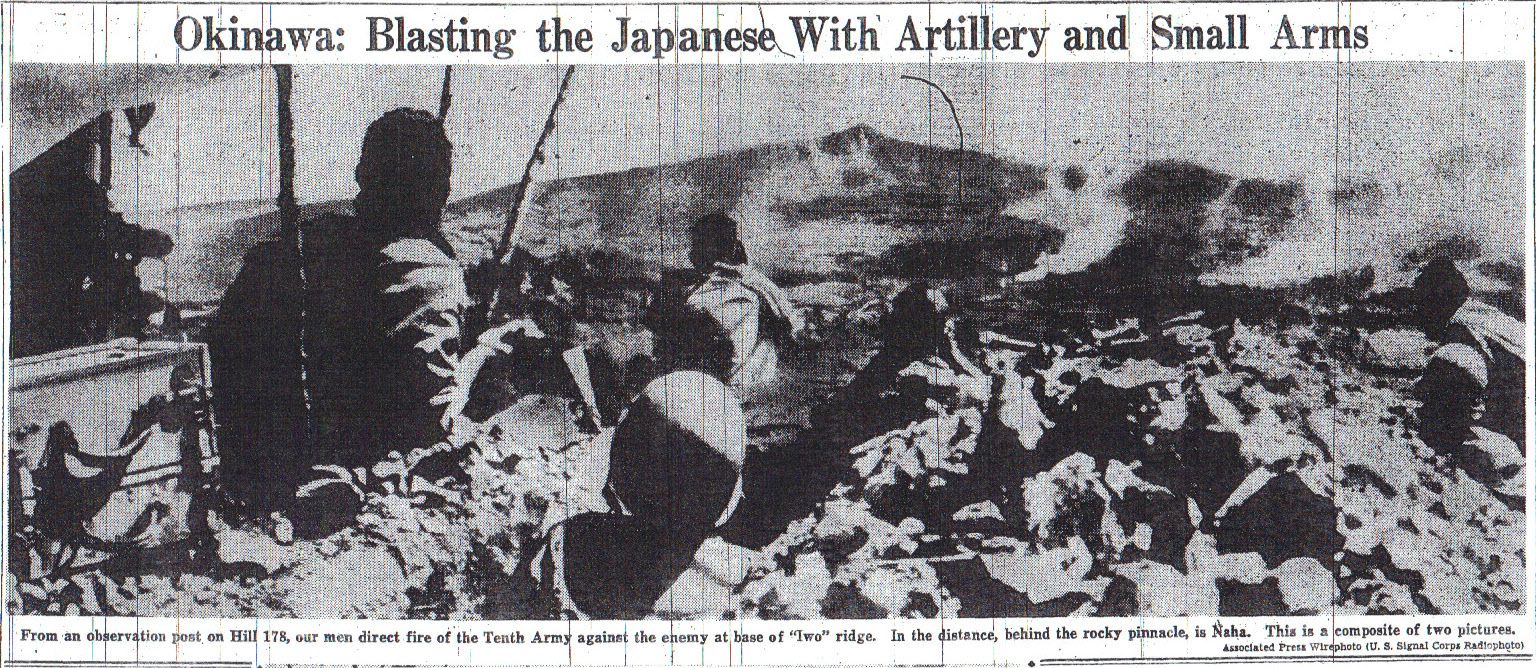
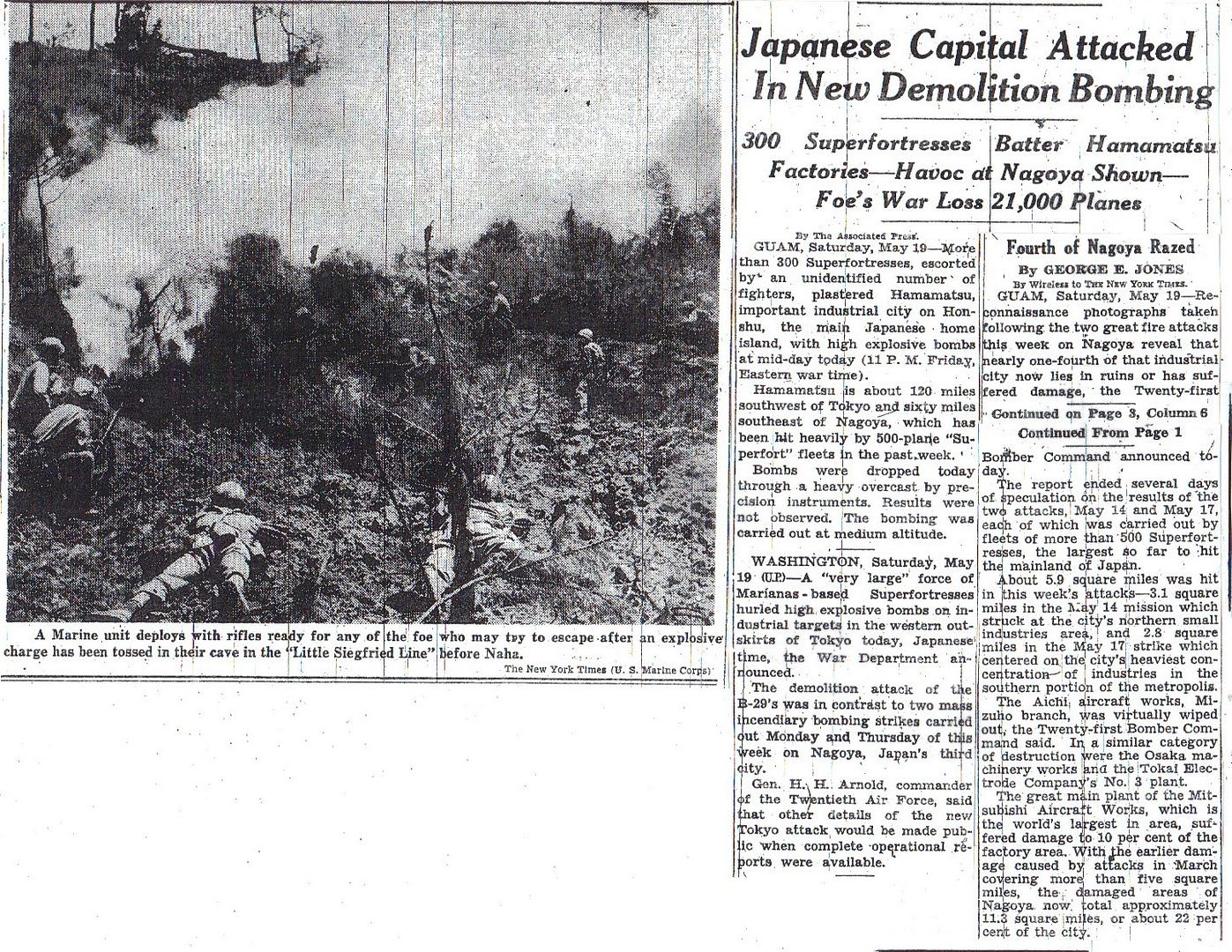
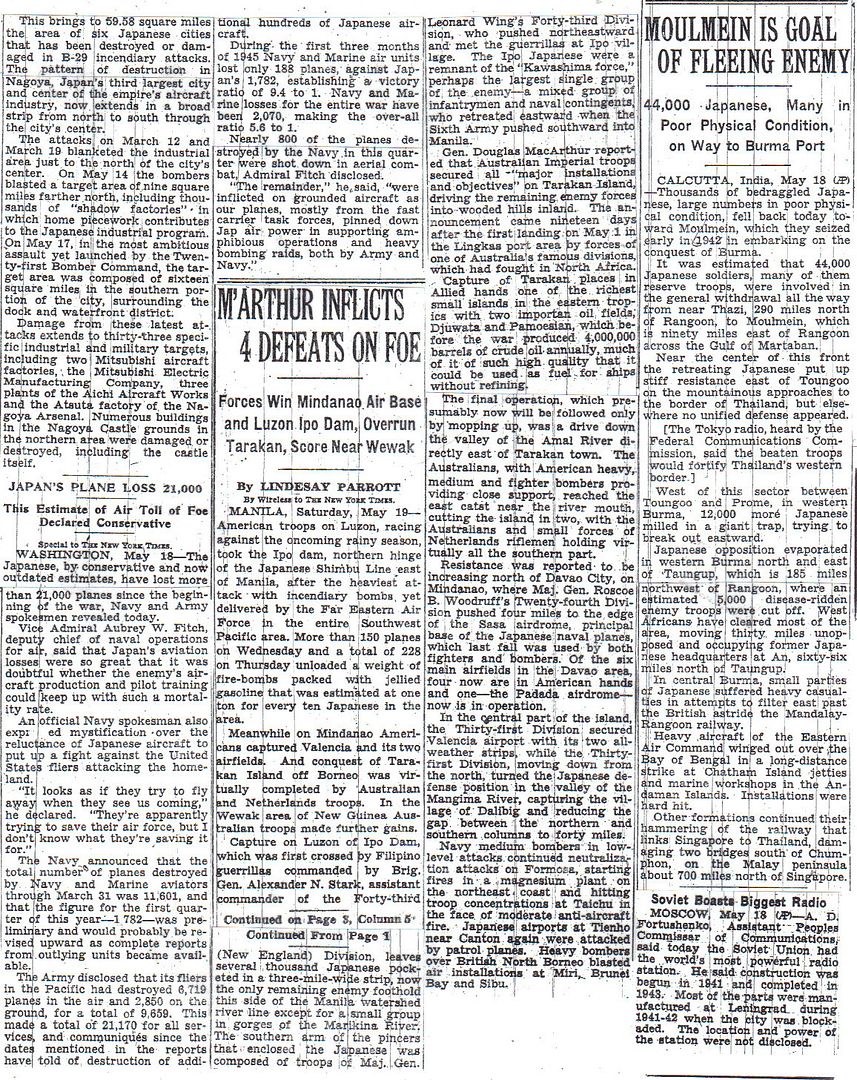
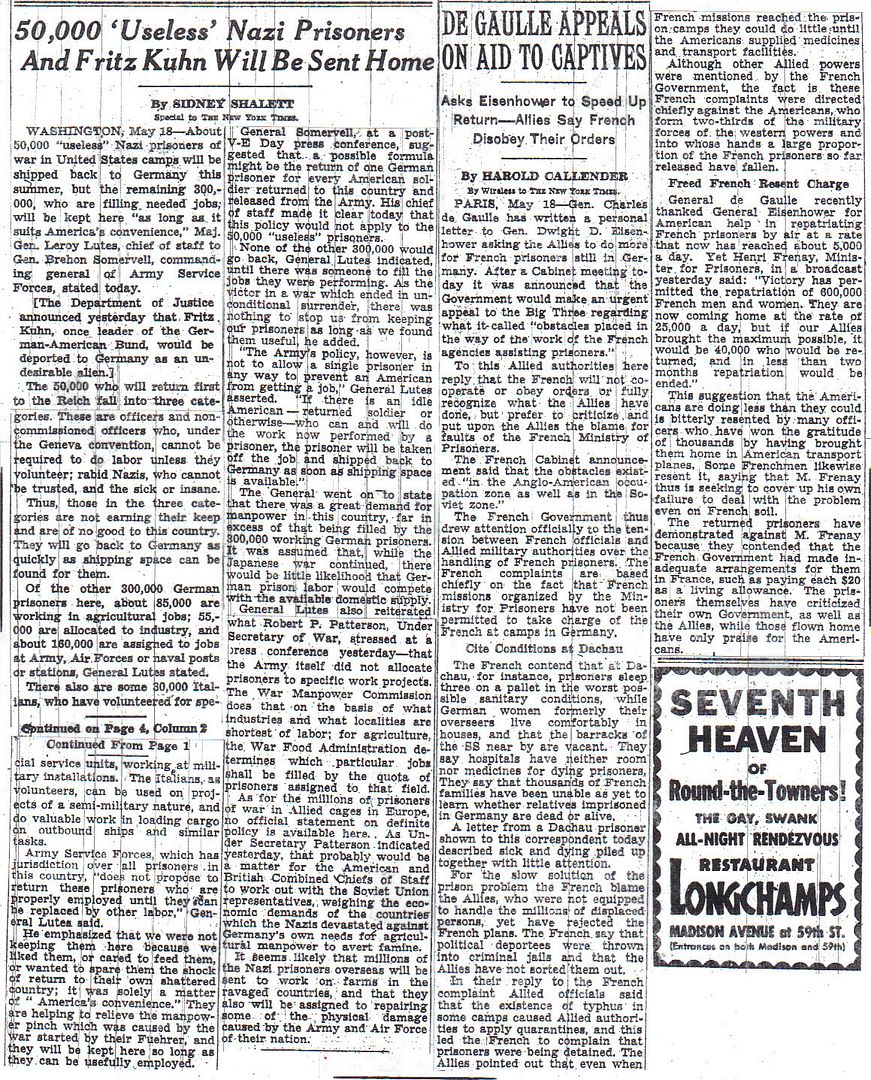
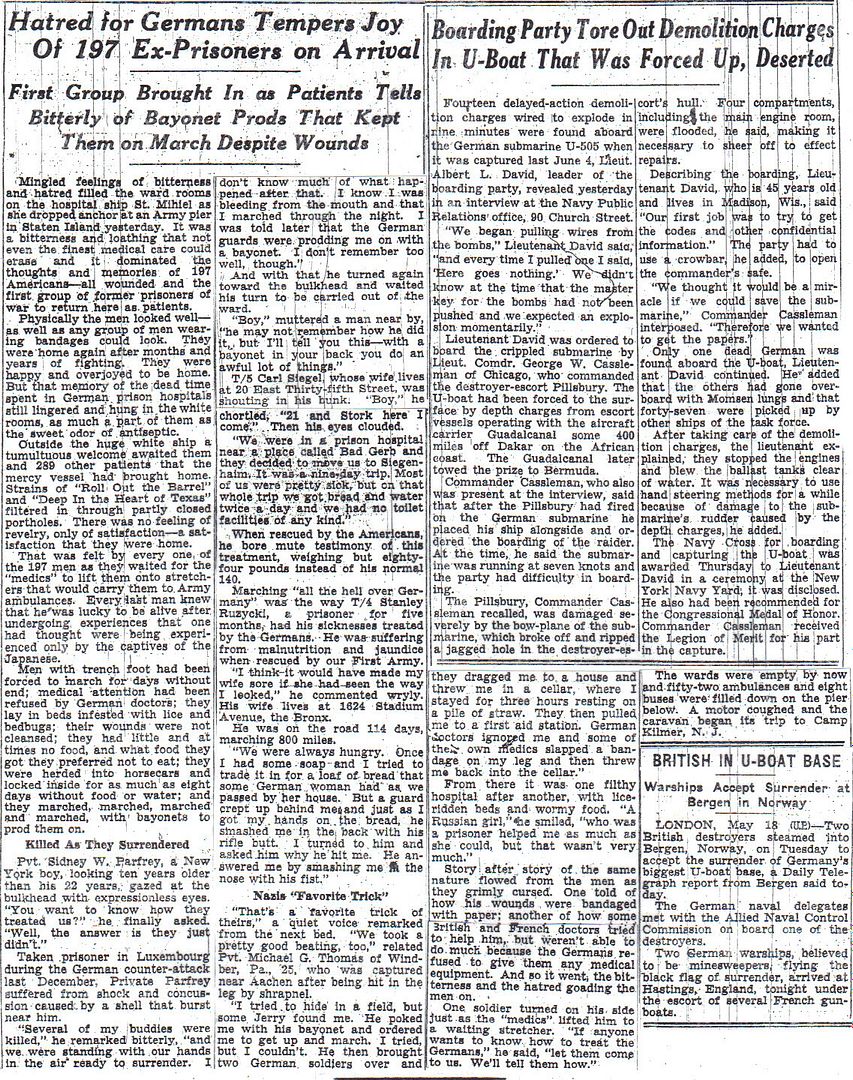
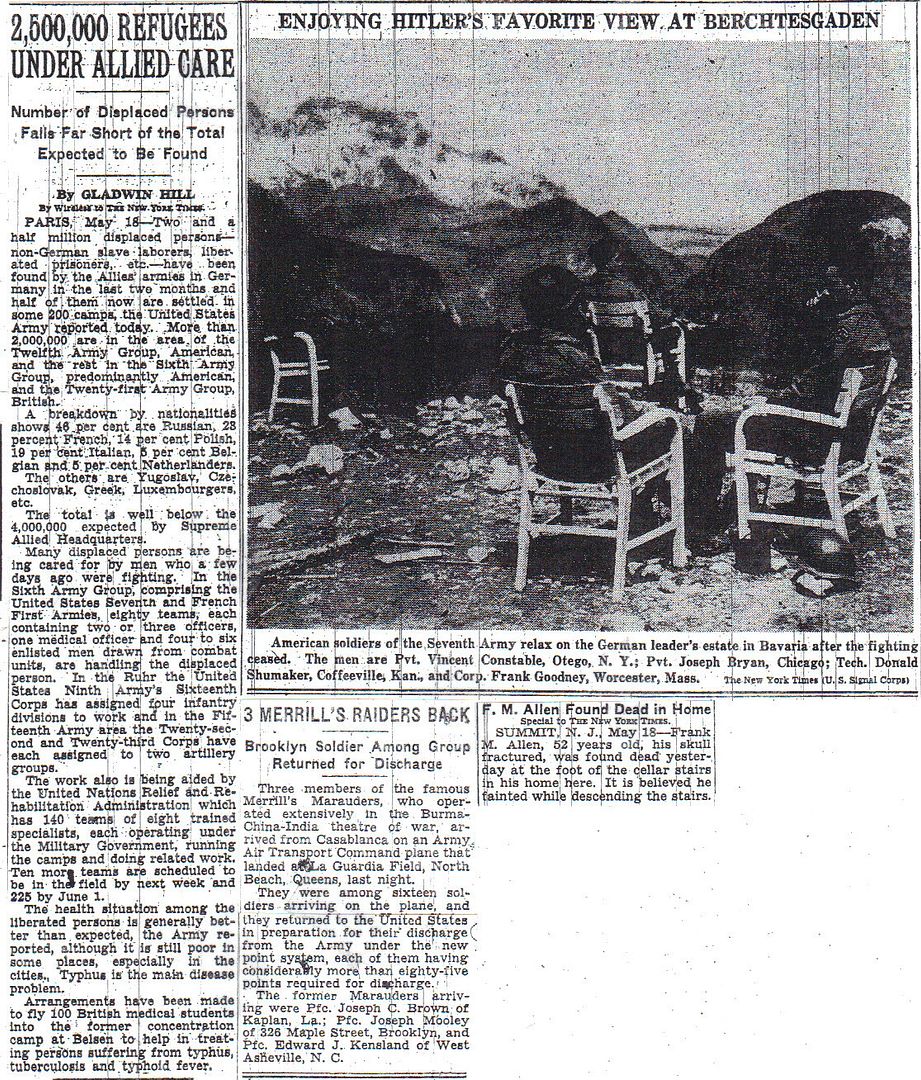
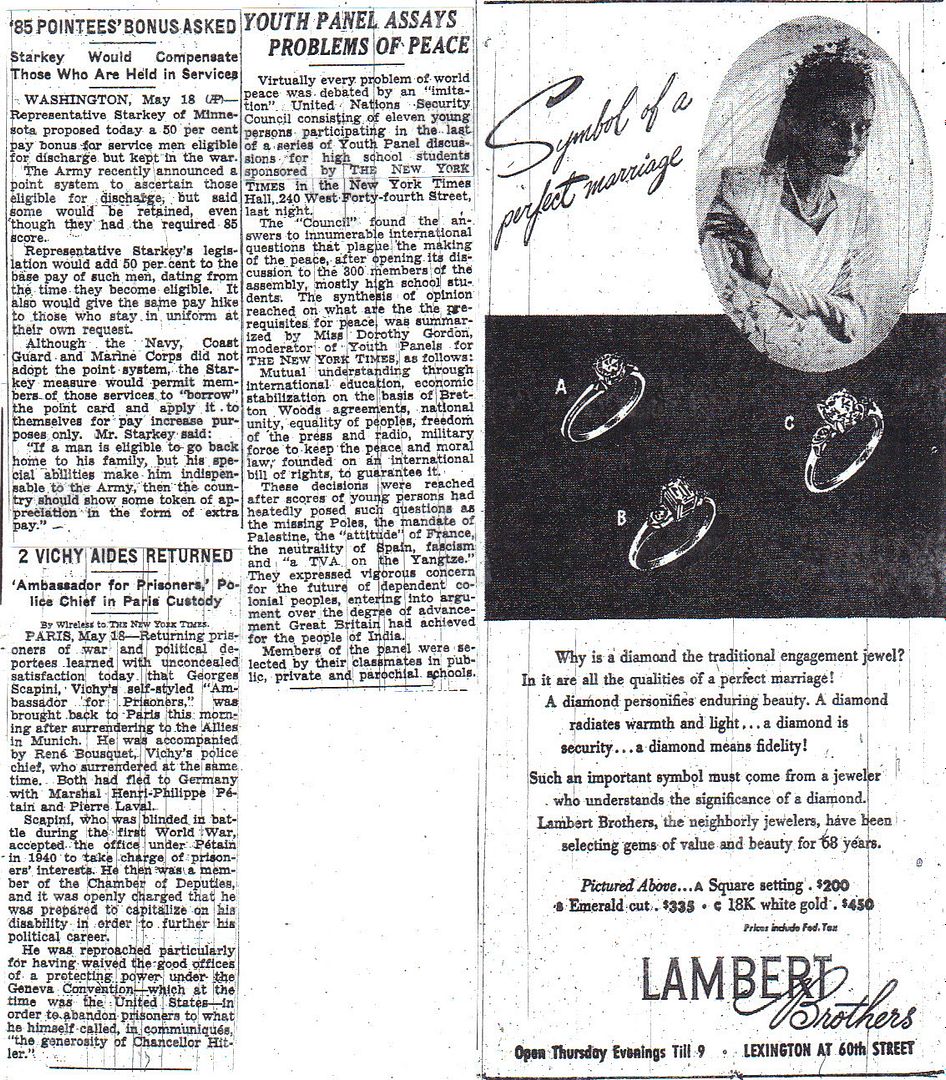
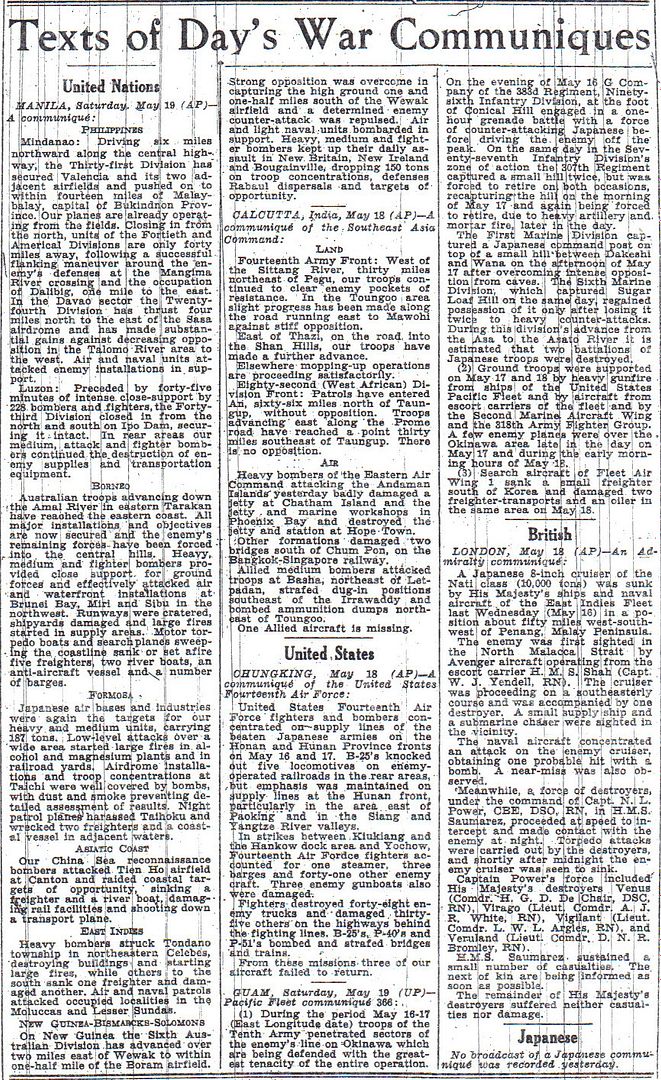
#1 – “Sentimental Journey” – Les Brown, with Doris Day
#2 - “Bell Bottom Trousers” - Tony Pastor, with Ruth McCullough
#3 - “My Dreams are Getting Better All the Time” - Les Brown, with Doris Day
#4 – “There! I’ve Said It Again” – Vaughn Monroe
#5 - “Candy” - Johnny Mercer, with Jo Stafford and the Pied Pipers
#6 - “Dream” - Pied Pipers
#7 – “Laura” – Woody Herman
#8 - “Chloe” - Spike Jones, with Red Ingle
#8 – “Laura” – Freddy Martin
#9 - “Caldonia” - Woody Herman
#10 – “Laura” - Dick Haymes
#10 - “You Belong to My Heart” - Charlie Spivak, with Jimmy Saunders
http://www.etherit.co.uk/month/4/19.htm
May 19th, 1945 (SATURDAY)
UNITED KINGDOM: Minesweeper HMS Pyrrhus launched.
GERMANY: Flensburg: Alfred Rosenberg, the Nazi Party’s unofficial philosopher, responsible for formulating the party’s race policies, is arrested.
Hermann Göring is captured by forces of the American Seventh Army. (Gene Hanson)
MIDDLE EAST: French troops arrive in Syria and Lebanon, sparking off nationalist demonstrations
NEW GUINEA: Australian forces capture Wewak, the last Japanese-held port on the mainland, after a bitter struggle.
JAPAN: As 272 B-29s today hit Hamamatsu on Mission 178, it was revealed that a quarter of Nagoya, Japan’s main aircraft-manufacturing city, has been flattened by two raids in the last week.
The aircraft, from the USAAF’s Twentieth Air Force based on the Mariana Islands, also made an abortive raid on aircraft industry targets in Tachikawa. 14 others hit targets of opportunity; four B-29s are lost.
The raids on the two cities are the start of attacks on Japan’s secondary industrial centres with populations under 200,000.
Reconnaissance photos released today revealed the results of two fire-bomb raids by fleets of over 450 B-29s, the largest so far to strike at mainland Japan, which hit Nagoya three and five days ago, setting fire to 5.9 square miles of the city. Since incendiary attacks began, nearly 60 square miles of Japanese cities have been wiped out. Nagoya’s Aichi aircraft works and two other key factories were destroyed, while Mitsubishi’s aircraft plant, the world’s largest, was damaged. Results of today’s high-explosive raid on Hamamatsu, 120 miles from Tokyo, are not known. Bombs were dropped through the clouds from medium altitude using precision instruments.
RYUKU ISLANDS: Ie Shima: VII Fighter Command, United States’ Seventh Air Force bases the 413th Fighter Group flying P-47Ns on this island.
CHINA: Foochow: Japanese troops today abandoned the east coast treaty port of Foochow, seven months after capturing it. Two other east-coast ports, Amoy and Swatow, have also been abandoned, their forces retreating to Hong Kong, confirming reports that Tokyo has ordered a strategic withdrawal from south China. Since the US recapture of the Philippines these ports have come within US bomber range. In the event of an invasion these garrisons would be isolated, cut off from support from Japan or Formosa.
CANADA: The only submarine to be operated by the RCN during the war is commissioned. HMCS Esquimault is the former U-190. (Dave Hornford)
U.S.A.: Escort carrier USS Salerno Bay commissioned.
U-873 commander, Kptlt Friedrich Steinhoff, committed suicide while being kept in a street prison in Boston instead of a POW camp.
Corvette HMCS Barrie departed New York with Convoy HX-357.
BTTT
"It was impossible to have a normal childhood in a concentration camp, but parents and other adults often sought to provide some sense of normality for the children imprisoned in the camps.
This little girl, photographed in Prague, Czechoslovakia, wears her camp uniform while holding a stuffed animal and a ball, toys she undoubtedly held dear."
"The Nazis, as part of their effort to give their crimes an aura of legality, were fanatics about paperwork.
These deportation notices, discovered in Prague, sent thousands of Czechs to their deaths.
These papers also helped convince victims that they were indeed going to be resettled in the East rather than shipped to extermination camps."
"Aliya Bet refers to the illegal migration of Jews to Palestine before the creation of the state of Israel in 1948.
Approximately 25 percent of the 530,000 Jewish immigrants who entered Palestine before 1948 did so by way of Aliya Bet.
"While some Jews who illegally entered Palestine took the trip on their own initiative, many journeys were arranged by Zionist organizations.
The majority of immigrants traveled by boat, although some took an overland route from Eastern Europe.
Some Jews simply remained in Palestine after entering as tourists. Regardless of the method employed, illegal Jewish immigration was challenged by the British (who governed Palestine) at every juncture.
More than 50,000 people were caught (above) and deported to detention camps in Cyprus.
"After the war, Zionists worked feverishly to relocate survivors of the Holocaust from Europe's displaced-persons camps to Palestine.
The high visibility of Aliya Bet and the international pressure it brought to bear were instrumental in the creation of a Jewish state."
"Nazi doctors took unconscionable advantage of the human guinea pigs at their disposal.
This woman, a concentration-camp survivor, was the victim of horrific 'experimental' operations upon her breasts.
Possibly, the doctors were testing a new treatment for cancer or were interested in various aspects of the woman's reproductive system."
"The chief rabbi of Rome, Dr. David Prato (left), discusses the problems of displaced European Jews in Italy with the chief rabbi of Jerusalem, Isaac Herman Herzog, and a representative of the European headquarters of the American Joint Distribution Committee, Arthur Greenleigh.
Although only 40 percent of the displaced persons who migrated to the U.S. after the war were Jews, Americans assumed that Jews comprised the vast majority and, in general, opposed this immigration.
But once it became clear that most Jewish displaced persons wanted to go to Israel, American opinion began to favor Jewish emigration from Europe.
A blunt analysis of this situation was made by postwar British Foreign Minister Ernest Bevin:
The Americans were enthusiastic about opening Palestine to the Jews because they didn't want to have many of them in New York."
"Major Eli J. Paris, a successful Philadelphia business executive before the war, was selected by General Clarkson to serve as Baguio's civil Affairs administrator.
Noting the need for prompt corrective measures, Major Paris took immediate steps to curb the chaotic conditions prevalent within the city.
His first act was to provide shelter for the large numbers of homeless.
Huge tent camps were erected where civilians were given emergency medical treatment and Army field rations.
During the day hundreds of them left the camp areas to work on reconstruction of their bombed-out residences.
"PCAU 7, commanded by Lt. Col. E. E. Hobson, entered Baguio shortly after its liberation.
Working in conjunction with Major Paris's office, PCAU opened stores all over the town where Army rations and captured Japanese foodstuffs were sold across the counter at token prices.
In addition to succoring Baguio's hungry population, this procedure did much to stifle black-market operations.
Employment offices were established where Filipinos could apply for work with the Golden Cross as road and camp builders or as carriers of materiel for forward infantrymen.
Pay rates ran between two and three pesos per day for this labor.
Large strides toward recovery were made once civil affairs units untangled the skeins of disorder and restored a semblance of organization to Baguio.
Much sickness and insanitation were curbed when Division engineers repaired water purification plants.
Reconditioned electric power installations permitted the residents of the summer capital to labor beyond daylight hours and employ electrically operated tools in rebuilding homes and businesses.
Another major Golden Cross contribution to the welfare of the Filipinos was a 500-bed municipal hospital, equipped with Army medical supplies.
"When civil affairs' corrective measures began to bear fruit, Major Paris made the recommendation that all phases of city government be turned back to the Filipinos.
Division was to remain on the scene in an advisory capacity.
Accordingly, Baguio's last mayor prior to Japanese occupation, Vicsio Valderassa, was reappointed to office.
Valderassa had stubbornly opposed the enemy throughout the war and commanded the respect of the entire population.
For administrative assistants he selected men who also refused to swear allegiance to Nippon.
By the end of the Division's stay in Baguio, local residents had become selfreliant to a large extent.
"Little training was done by infantry elements in Baguio.
Replacements came in from depots at Manila and these men went through a full work day.
For the veterans, however, the military itinerary was confined to housekeeping, calisthenics, occasional close-order drill and parades for the purpose of awarding decorations.
A few officers and noncoms were detailed to help train young, green Filipinos who had come to Baguio to enlist in the Philippine Army.
For the most part though, everyone, save the troops still tactically employed, relaxed and enjoyed life.
Decorations ceremonies in the summer capital vastly differed from the ones staged during the Battle for Baguio.
Here, a man's entire battalion was turned out to witness the affair and pass in review before him as he stood beside the Division Commander.
During the fighting the method of presentation was far more informal, and according to recipients, far more satisfying. General Clarkson habitually called in at G-1 prior to his daily tour of the infantry battalions to procure the names of the doughboys approved for combat awards.
With his pockets stuffed with Silver and Bronze Stars, the General visited the various battalion CPs where he requested to see the men.
"Upon their arrival at the CP these bearded, exhausted figures were surprised to see General Clarkson saunter forward, introduce himself and strike up an easy conversation.
In the course of these discussions, the Division CG would reach into his pocket, extract a Silver or Bronze Star and pin it on a muddy fatigue jacket.
Haggard and tired as most of them were, their eyes could still light up in appreciation of their commander's considerate gesture.
"It was the same with field commissions.
No coldly worded Sixth Army order notified a 33d Division man that he had been raised from the ranks.
He discovered it when General Clarkson came up to his forward position and pinned the gold bar on his collar.
Acts like these made Golden Cross infantrymen think of their commander not only as a leader but as a comrade.
In one case, when S/Sgt. Lee A. Singer, Company C, 123d Infantry, was tendered a battlefield appointment, General Clarkson found him standing in a mess line with the rest of his unit at a Pugo rest camp.
This unglamorous setting did not deter the Division Commander.
Crashing the line, he made an impromptu presentation to Sergeant Singer who stood with a messgear dangling from his hand, canteen cup hooked over his belt and a wide grin across his bearded face.
This human touch of the General's did not go unrecognized.
Both Singer and his commander received a roar of approval that echoed throughout the camp.
"Coincident with the relief of the Division from combat came an order from Corps directing the 127th RCT of the 32d Division to relieve the Golden Cross in the Baguio area.
The 33d was told to move to the beaches in the Caba-Aringay-Bauang area, set up camps, and commence amphibious training for the projected fall assault on Japan.
Hatred for Germans Tempers Joy Of 197 Ex-Prisoners on Arrival – 8
The soldier mentioned at the bottom of the first column became actor Woodrow Parfrey (Dirty Harry, The Outlaw Josey Wales, and other film and TV roles)
The fighting on Okinawa is a grim preview of what Olympic would be like, only on a much larger scale. The more I read, I don’t think the Olympic forces would have been thrown back into the sea. On the other hand, we were not going to clear the island and pacify it before the scheduled launch of Coronet the following spring. In fact, I’m guessing we would not have cleared Kyushu at all without a much more massive effort than we had planned.
American forces slated for Olympic were 14 divisions, with a projected strength of just under 700,000 men, to take a rugged island much larger than Okinawa. The Japanese had 14 divisions and 11 brigades in defense. Although the manpower was less than the Americans, and they lacked artillery and ammunition, they were going to fight as tenaciously as the Japanese ever did.
The projected occupation of Kyushu in 90 days was not going to happen. The Sugar Loaf, Chocolate Drop and Shuri Castle would be repeated dozens of times.
I am curious as to how you caught that. Very interesting, btw.
I am a huge fan of Clint Eastwood movies. I remember reading up on Woodrow Parfrey as he played a supporting part in several of them. It said how he had been a POW and that his experiences changed how he viewed life and influenced how he portrayed the various roles that he had. Saw the name, saw his NYC hometown, and figured out it was him.
You get an A for the day.
Nuke ‘em, I say!
Today, we have ISIS, an nobody lifts a finger.
Great catch!
That said, I agree with you that it would have been a very heavy and bloody lift. The timetable was not realistic and I think we would have had to send more troops than originally planned in light of the heavy Japanese reinforcements. When Olympic was in the early planning stages Kyushu was lightly defended, but by May strong reinforcements were being sent. The Japanese knew our pattern and tactics that we would want land based air support to invade Honshu.
Disclaimer: Opinions posted on Free Republic are those of the individual posters and do not necessarily represent the opinion of Free Republic or its management. All materials posted herein are protected by copyright law and the exemption for fair use of copyrighted works.